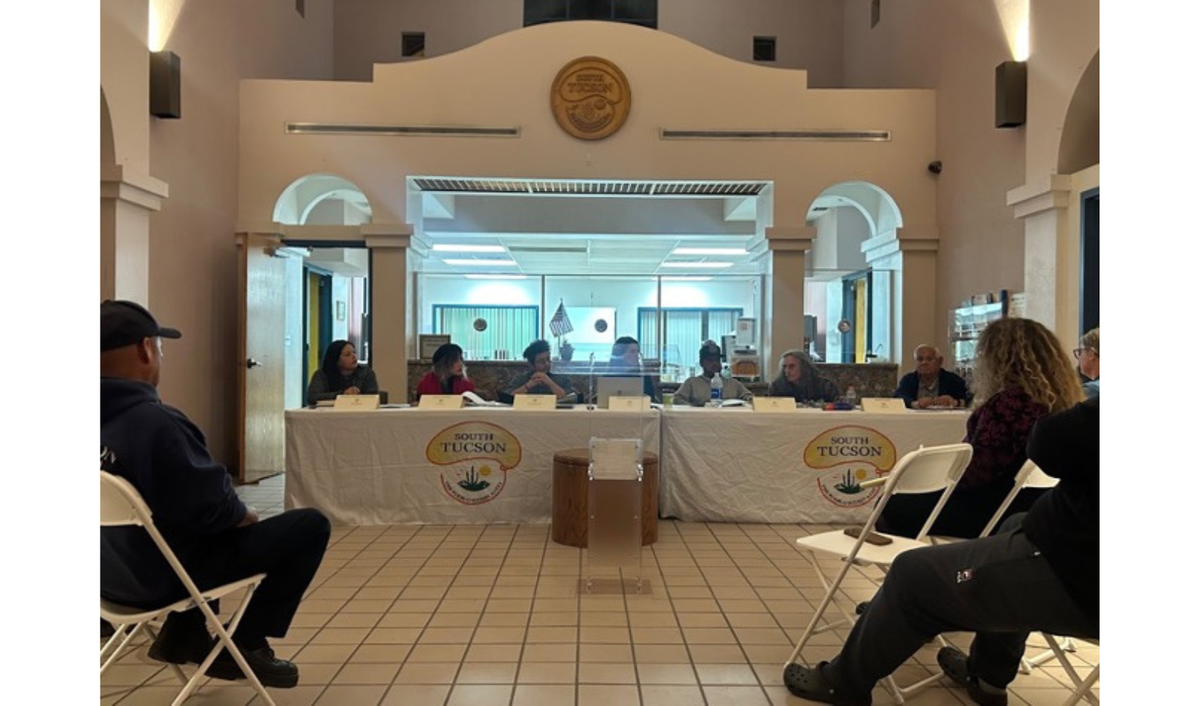South Tucson braces for mass deportations
The council approved a statement opposing mass deportation by a vote of 5-1, with Councilmember Paul Diaz casting the lone “no” vote.

South Tucson’s City Council issued a statement about potential mass deportation efforts from the incoming presidential administration, saying it condemns racist policies that target vulnerable community members.
The statement began as a resolution introduced by Council member Brian Flagg during the January 7 meeting, directing the city’s police department to not comply with such orders and detailing actions officers would be allowed and prohibited to take.
But concerns from the city attorney and police chief during a discussion of the resolution resulted in the council instead voting to issue a statement in line with the city of Tucson’s.
South Tucson’s statement reads:
“The City of South Tucson is committed to fostering a welcoming and inclusive community where all residents feel safe, respected and protected regardless of their race, ethnicity, national origin or immigration status and work out respect the rest have demonstrated the urgent need to explicitly condemn racist actions and policies that target vulnerable members of our community.”
The council approved the statement by a vote of 5-1, with Councilmember Paul Diaz casting the lone “no” vote. The statement will be signed by the council and South Tucson Police Chief Danny Denogean.
Denogean had previously proposed Flagg’s resolution, which said:
- Officers cannot use race, ethnicity, language, attire, or possession of foreign documents as reasons to suspect someone of being unlawfully present in the U.S.
- Officers are prohibited from prolonging stops, detentions, or arrests to check someone’s immigration status.
- Officers cannot use immigration status against individuals filing complaints or acting as witnesses.
- Officers will not transport individuals to federal immigration facilities solely to investigate immigration status.
- Officers must inform dispatch and clearly state the reason for the stop at the beginning of every vehicle stop.
- When possible, officers must get supervisor approval before making immigration-related inquiries to ensure they are justified.
- Officers will receive mandatory training on bias-free policing, cultural sensitivity, and the limits of their authority regarding immigration enforcement, using case studies and scenarios to improve understanding.
The fifth item would be especially challenging for police, if not impossible, Denogean said during the meeting
“Instead of focusing on concentrating on what they need to do, they have to be on the radio explaining stuff when they're supposed to be dealing with the situation,” Denogean said. “I also think that there's no reason to rush into this. We're not doing any of these things to begin with.”
Monica Velasco pushed for the resolution to be approved, saying she’s seen firsthand how a simple ticket can lead to family separations.
Velasco is an indigenous woman from Oaxaca, Mexico who migrated to Tucson in 2006, after a prolonged teacher’s strike due to a political crisis meant she could no longer work.
“The officer is not understanding me because he does not know Spanish, and I do not know English. How does that communication work? How does he understand what I am telling him?” Velasco asked Denogean, speaking in Spanish. “You ask me for identification, I can't show it to you. What does the officer do? More investigations. They give you a ticket and make a 10-15 minute stop into half an hour, 45 minutes, two-hour stop because the officer didn't know how to respond. ”
She said that Prop 314 will only empower police to use the law as a justification. She recounts her experience during the SB 1070 era, highlighting the way officers would “show their power” by instilling fear of deportation in undocumented people.
“How are you going to support me? How will you support our community? I'm here representing too many families like me that have been affected since SB 1070, who don't have an ID but we work, and you can't imagine how much we work,” she said. “We pay our taxes, our children go to schools and we want them to graduate and be part of the community. I think we should be given protection.”
The city attorney recommended not moving forward with the resolution, saying it could be challenged by state law. Council member Melissa Brown-Dominigez also worried that the city could be hurt financially if legal challenges arised, leading council members to move instead to issuing a statement.
Other meeting actions included:
- South Tucson’s Fire Department was able to stay staffed throughout the holidays, thanks to the incentives offered by City Manager Veronica Moreno, including weekend pay and double time holiday pay, according to Police Chief and Public Safety Director Denogean, adding that this was the first time in a long time the fire department’s holiday schedule has been fully staffed.
- South Tucson is partnering with the University of Arizona through an award-winning urban planning capstone course during which graduate students will help develop and explore innovative urban planning strategies that address community priorities through hands-on projects. The students will meet with local stakeholders and community members to analyze real world challenges and promote creative solutions. The project has previously worked with municipalities including Tucson, Oro Valley, Marana and Tuba City.
- South Tucson's Community Investment Advisor Selina Barajas announced a $10,000 grant that will invest in five local legacy businesses (stay tuned for our story.)
Susan Barnett is Deputy Editor of Tucson Spotlight and a graduate student at the University of Arizona. She previously worked for La Estrella de Tucson. Contact her at susan@tucsonspotlight.org.
Tucson Spotlight is a community-based newsroom that provides paid opportunities for students and rising journalists in Southern Arizona. Please support our work with a paid subscription.



